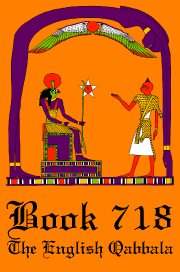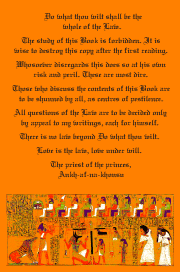| [This diary is extremely incomplete and fragmentary. Many entries, too, are evidently irrelevant or “blinds.” We omit much of the latter two types.]
|
| This eventful year {-1} finds me at a nameless camp in the jungle of Southern Province of Ceylon; my thoughts, otherwise divided between Yoga and sport, are diverted by the fact of a wife. . . .
|
| [This reference to Yoga is the subconscious Magical Will of the Vowed Initiate. He was not doing anything; but, on questioning himself, as was his custom at certain seasons, he felt obliged to affirm his Aspiration.]
|
{ 11} 11} | . . . [Much blotted out] . . . missed deer and hare. So annoyed. Yet the omen is that the year is well for works of Love and Union; ill for those of Hate. Be mine of Love! [Note that he does not add “and Union.”]
|
{ 7} 7} | Embark of Suez.
|
{ 17} 17} | Suez.
|
{ 18} 18} | Landed at Port Said.
|
{ 19} 19} | To Cairo.
|
{ 21} 21} |
|
| [This entry is quite unintelligible to us.]
|
{ 29} 29} | To Helwan as Oriental Despot.
|
| [Apparently P. had assumed some disguise, probably with the intention of trying to study Islam from within as he had done with Hinduism.]
|
{ 30} 30} | Began golf.
|
{ 24} 24} | Began INV. [invocation].  . .
|
{ 25} 25} |  9 appeared. 9 appeared.
|
{ 26} 26} | Told to INV. [invoke]  10 as 10 as  by new way. by new way.
|
{ 27} 27} | Did this badly at noon 30.
|
{ 0} 0} | At 10 p.m. did well—Equinox of Gods— —Nov [“?” new] C.R.C. [Christian Rosy Cross, we conjecture.] Hoori now Hpnt [obviously “Hierophant”]. —Nov [“?” new] C.R.C. [Christian Rosy Cross, we conjecture.] Hoori now Hpnt [obviously “Hierophant”].
|
{ 1} 1} |  in in  . I. A. M. [? one o’clock.] . I. A. M. [? one o’clock.]
|
{ 2} 2} | X. P. B. 
|
| [May this and the entry {Aires 4} refer to the Brother of the A A A who found him?] who found him?]
|
| E. P. D. in 84 m.
|
| [Unintelligible to us: possibly a blind.]
|
{ 3} 3} | Y.K. done [? His work in the Yi King.]
|
{ 4} 4} | Met  again. again.
|
{ 5} 5} |
|
| [Blot] wch trouble with ds.
|
| [Blot] P. B.
|
| [All unintelligible; possibly a blind.]
|
{ 17} 17} | Go off again to H, taking A’s p.
|
| [This probably a blind.]
|




 again.
again.


